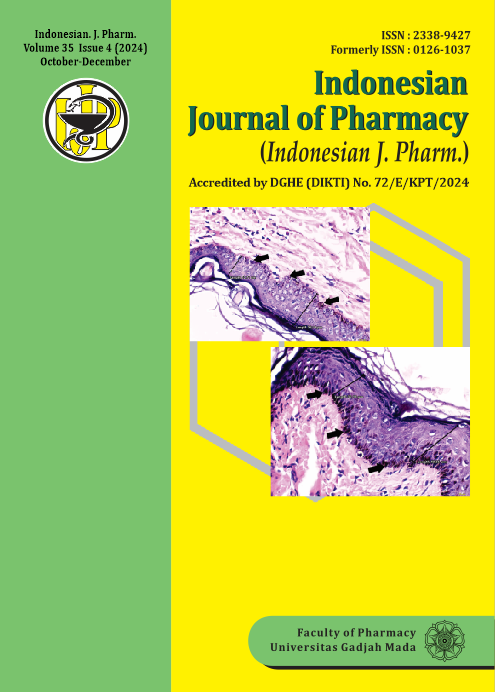Validating the Instrument of Parents' Knowledge and Attitudes towards Giving Antibiotic for Children in two Hospitals at South Sulawesi
Abstract
To translate, adapt and validate the instrument of Parents' Knowledge and Attitudes towards giving Antibiotics for Children. Participants were recruited from two hospitals in South Sulawesi, one private and one government hospital. The study started with the translation of the instrument from English to Indonesian (forward and backward translation). Next, the translation result was tested on 40 participants. The final stage was validation involving 300 participants. The analysis used known group validity, construct validity, product-moment correlation, and factor analysis. Internal consistency between items used Cronbach Alpha. A total of 300 participants (200 in private hospitals and 100 in government hospitals). From the participants, 113 participants were outpatients and 187 were inpatients. In the adaptation stage, some vocabulary changes were made to sentences that were not understood by participants in instrument items using words easily understood by the participants. For example, in the knowledge domain, the word "pathogen" was changed to ‘disease-causing bacteria’. In the validation stage, the significance value was 5%, and the r-table value was 0.113. Based on the validity test on 14 items in the knowledge domain, the r-count value was 0.256-0.589, while on 12 items in the attitude domain, the r-count value was 0.375-0.662. The Kaiser-Meyer-Olkin (KMO) value was 0.793. From 14 question items in the knowledge domain, 3 factors were formed. Cronbach alpha value of each domain was >0.6, knowledge (0.759) and attitude (0.744). Instrument reliability for outpatient and inpatient care was 0.768 and 0.752 for knowledge, 0.740 and 0.744 for attitude, respectively. The results of this study indicate that the instrument of Parents' Knowledge and Attitudes towards giving Antibiotics to Children is reliable and valid. This instrument can be used for both outpatients and inpatients.
References
Albalawi et al. 2020. Knowledge, Attitude, and Practise of Parents regarding the use of antibiotics among their children with upper respiratory tract infection. International Journal of Medicine in Developing Countries. 2020;4(3):753–758. https://doi.org/10.24911/IJMDC.51-1579174920
Alili-Idrizi et al. 2014. Validation of the parental knowledge and attitude towards antibiotic usage and resistance among children in Tetovo, the Republic of Macedonia. Pharmacy Practice 2014 Oct-Dec;12(4):467.
Andriyani S et al. 2020. Hubungan Antara PengetahuanDengan Tingkat Kecemasan Ibu TentangHospitalisasi Pada Anak. Jurnal Keperawatan BSI, Vol. VIII No.1 April 2020
Arifin B et al. 2017. Translation, Revision, and Validation of the Diabetes Distress Scale for Indonesian Type 2 Diabetic Outpatients with Various Types of Complications. VALUE IN HEALTH REGIONAL ISSUES 12C (2017) 63–73
Arifin B, et al. 2017. Translation, revision, and validation of the diabetes distress scale for Indonesian type 2 diabetic outpatients with various types of complications. Value Health Reg Issues 2017;12:63–73.
Artaya, I Putu. 2018. Analisis Faktor (Factor Analysis). ResearchGate, 1-11 https://doi.org/10.13140/RG.2.2.27644.39047.
Atif et al. 2018. Knowledge, Attitude And Practices Regarding Antibiotics Use Among Parents For Their Children. IJPSR, 2018; Vol. 9(5): 2140-2148. https://doi.10.13040/IJPSR.0975-8232.9(5).2140-48
Dewi, Shinta K and Agus Sudaryanto. 2020. Validitas dan Reliabilitas Kuisioner Pengetahuan, Sikap dan Perilaku Pencegahan Demam Berdarah. Prosiding Seminar Nasional Keperawatan Universitas Muhammadiyah Surakarta.E-ISSN : 2715-616X.
Hammour et al. 2018. An exploration of parents’ knowledge, attitudes and practices towards the use of antibiotics in childhood upper respiratory tract infections in a tertiary Jordanian Hospital. Saudi Pharm J. 2018;26(6): 780–5. https://doi.org/10.1016/j.jsps.2018.04.006
Healen, R and Alison Twycross. 2015. Validity and reliability in quantitative research. Evid Based Nurs July 2015 volume 18 number 3: 66-67
Kemenkes RI. 2011. Peraturan Menteri Kesehatan Republik Indonesia Nomor 2406/Menkes/Per/Xii/2011 Tentang Pedomale Umum Penggunaan Antibiotik. Jakarta 23 Desember 2011: Menteri Kesehatan Republik Indonesia.
Krabbe PFM. 2016. The Measurement of Health and Health Status: Concepts, Methods, and Applications from a Multidisciplinary Perspective. San Diego, CA: Elsevier/Academic Press.
Oh, et al. 2011. Public knowledge and attitudes towards antibiotic usage: a cross-sectional study among the general public in the state of Penang, Malaysia. J Infect Dev Ctries 2011; 5(5):338-347
Putri, Dianita R. 2018. Analisis Tingkat Pengetahuan Orang Tua Terhadap Penggunaan Antibiotik Pada Anak Di Apotek “X” Kabupaten Ponorogo. Universitas Muhammadiyah Ponorogo, ISBN: 978-602-5605-00-0
Yu M et al. 2014. Knowledge, attitudes, and practices of parents in rural China on the use of antibiotics in children: a cross-sectional study. BMC Infectious Diseases 2014, 14:112. https://doi:10.1186/1471-2334-14-112
Radosević N, et al. 2009. Attitudes towards antimicrobial drugs among general population in Croatia, Fyrom, Greece, Hungary, Serbia and Slovenia. Pharmacoepidemiol Drug Saf. 2009 Aug;18(8):691-6. PMID: 19444809. https://doi.10.1002/pds.1768
Stella, et al. 2019. Hubungan antara pengetahuan dan sikap ibu terhadap perilaku penggunaan antibiotik pada anak di Kelurahan Tomang periode Januari-Maret 2017. Tarumanegara Medical Journal Vol. 1, No. 2, 410-416, April 2019.
Wang, et al. 2019. Shanghai Parents’ Perception And AttitudeTowards The Use Of Antibiotics On Children: A Cross-Sectional Study. Dove Press. Infection and Drug Resistance 2019:12 3259–3267.https://doi.org/10.2147./IDR.S219287








